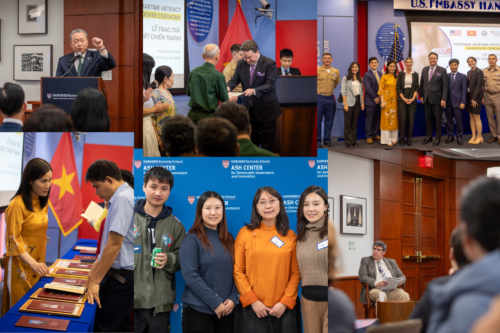On February 14th, voters in the world’s third-largest democracy cast their vote in a high-stakes general election, choosing a replacement for long-time President Joko Widodo. As the polls closed, it became clear that Prabowo Subianto — a former army general with a checkered human rights past — would claim a surprising victory, winning well over 50% of the vote and guaranteeing the election would not go to a runoff in June.
To better understand how the election unfolded and what Prabowo’s success means for the future of Indonesia, the Rajawali Foundation Institute for Asia at Harvard Kennedy School convened a panel of experts. Jay Rosengard, chair of the Indonesia Public Policy Program at the Rajawali Institute, moderated a conversation between Made Supriatma, Visiting Fellow, ISEAS-Yusof Ishak Institute, and Deasy Simandjuntak, Visiting Fellow, ISEAS-Yusof Ishak Institute; International College of Innovation, National Chengchi University Taiwan.
The following excerpts were taken from the discussion and have been edited for clarity.
On Prabowo’s Appeal
Made Supriatma: “I think the appeal for him is as a strong leader, that’s for sure. His military background, his patriotism, and he always says that I am ready to sacrifice my life for the nation. It’s a kind of cheap nationalism.”
Deasy Simandjuntak: “I think it’s true that the Jokowi [Joko Widodo] factor, the J factor here, is very influential. Both because he’s popular and secondly, because he has the power or perceived power.”
“Remember that this year there’s a lot of youth voters, 52%. At the same time as Prabowo is exuding this strongman image. He also portrays a relaxed kind of image; he would be dancing on stage more than he spoke.”
Was it a fair and free election?
Made Supriatma: “This election is very, very close to the New Order [previous regime of General Suharto] elections. So many similarities because of the Jokowi factor. Of course, he [Widodo] is a very, very popular president, but at the same time, he also uses the state apparatus, especially the police with the backup of the military and the civil servants… Jokowi has an immense power to move the state in Prabowo’s favor.”
Deasy Simandjuntak: “The alleged neutrality of the state apparatus is not legit.”
Is this a new, New Order?
Made Supriatma: “I’m very worried actually… The signs are already emerging.
The thugs that become the paramilitary have emerged right now… They’re really gearing up because this is their win.”
“What I heard from Jakarta was that there’s a sense that we are in 1965 right now. Because Sukarno was ailing at the time, and now we have the president who is not in a very good condition.”
Deasy Simandjuntak: “Prabowo is not Jokowi. And of course, he benefited from Jokowi’s popularity that’s true. But when he becomes president, I don’t think he would be following to the teeth Jokowi’s policies. Prabowo stands for a lot of different things. We know that he implied that he’s into a strong state, right authoritarianism. He doesn’t use the word but, you know, a strong state.”
Changing Foreign Policy
Made Supriatma: “I think Prabowo is very nationalistic… He said it over and over again that if you want to be respected, you have to have power… In his first debate, I think I have been watching him for quite some time, well since his first run as for president, and he’s always put “Indonesia First,” borrowing the phrase from the United States.”
“I think there’s a love and hate relationship between Prabowo and the U.S., he was banned for a long time. He always believed in some sort of conspiracy theories against the U.S. but in terms of China, I don’t think he will be as close as Jokowi in terms of military relations. I think he’s leaning more towards the U.S.”



